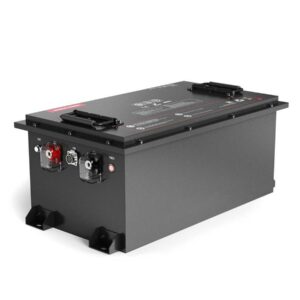
How to Navigate the Wholesale Lithium Battery Market Effectively?
Wholesale lithium batteries provide bulk pricing for industries requiring high-performance energy storage. These batteries are used in electric vehicles, renewable energy systems, and consumer electronics. Key factors include battery lifespan, safety certifications, and scalability. Top suppliers offer customized solutions with warranties. Always verify supplier credentials and compliance with international standards like UN38.3.
48V 100Ah LiFePO4 Golf Cart Battery BMS 200A
What Are the Key Advantages of Purchasing Lithium Batteries Wholesale?
Buying lithium batteries wholesale reduces costs by 20-40% compared to retail. Bulk orders ensure consistent quality and compatibility for large projects. Wholesalers often provide tailored voltage/capacity configurations, technical support, and logistics assistance. For example, Redway Power offers modular designs for scalable energy storage in solar farms.

How Do Lithium Batteries Compare to Other Battery Types in Bulk Purchases?
Lithium batteries outperform lead-acid/NiMH alternatives with 3x longer lifespan (2,000-5,000 cycles) and 50% lighter weight. They maintain 80% capacity after 1,000 cycles versus 300-500 cycles for lead-acid. Though 30% pricier upfront, lithium’s total cost of ownership is 60% lower over 10 years due to reduced replacement frequency.
| Battery Type | Cycle Life | Weight (kWh) | 10-Year TCO |
|---|---|---|---|
| Lithium | 2,000-5,000 | 3-5 kg | $8,000 |
| Lead-Acid | 300-500 | 8-12 kg | $20,000 |
Which Industries Benefit Most from Wholesale Lithium Battery Purchases?
EV manufacturers secure 25% cost savings through wholesale procurement. Data centers use lithium UPS systems for 99.999% uptime. Solar installers bundle 48V lithium banks with inverters. Emerging markets include marine (300Ah deep-cycle batteries) and IoT networks (custom small-form-factor cells.
48V 100Ah LiFePO4 Golf Cart Battery BMS 315A
What Certifications Should Wholesale Lithium Battery Suppliers Have?
Mandatory certifications: UN38.3 (transport safety), IEC 62133 (cell safety), UL 1642 (fire resistance). Regional requirements include CE (EU), FCC (US), and GB/T (China). Reputable suppliers like Redway provide full documentation with third-party test reports. Avoid vendors without at least two safety certifications.
Certifications ensure compliance with rigorous safety and performance standards. For instance, UN38.3 testing includes altitude simulation, thermal cycling, and vibration tests to mimic transportation stresses. IEC 62133 certification specifically addresses cell stability under abusive conditions, requiring 150 hours of continuous operation at 45°C. Suppliers with ISO 17025-accredited labs demonstrate consistent testing rigor – a critical factor when ordering 10,000+ units.
| Certification | Scope | Region |
|---|---|---|
| UN38.3 | Transport Safety | Global |
| IEC 62133 | Cell Safety | International |
| UL 1973 | Stationary Storage | North America |
How Does Battery Management System (BMS) Design Impact Wholesale Purchases?
Advanced BMS prevents thermal runaway through real-time voltage/temperature monitoring. Tier-1 wholesalers integrate 5-layer protection: overcharge/discharge prevention, short-circuit cutoff, and cell balancing. For telecom towers, Redway’s BMS maintains ±1% voltage deviation across 200+ cells.
What Are the Hidden Costs in Wholesale Lithium Battery Procurement?
25% of buyers overlook import duties (5-15% of CIF value) and compliance testing ($2,000-$5,000 per model). Shipping 500kg lithium batteries via air requires Class 9 dangerous goods fees ($8/kg). Always request DDP (Delivered Duty Paid) terms and verify insurance coverage limits.
How to Evaluate Wholesale Lithium Battery Suppliers?
Top evaluation metrics: 5+ years in business, ISO 9001 certification, and 24/7 technical support. Audit factories for automated production lines – manual assembly increases defect risk by 300%. Request sample cycle testing: quality cells should achieve 80% capacity after 1,000 cycles at 1C discharge rate.
When evaluating suppliers, prioritize those with vertically integrated manufacturing. A 2023 industry survey revealed suppliers owning cell production facilities had 40% fewer warranty claims. Demand factory audit reports showing robotic welding systems and climate-controlled formation rooms. For mission-critical applications, verify MTBF (Mean Time Between Failures) statistics – top-tier suppliers achieve 100,000+ hours for industrial battery packs.
What Are the Latest Innovations in Wholesale Lithium Battery Technology?
2023 breakthroughs include graphene-enhanced anodes (20% faster charging) and solid-state prototypes with 500Wh/kg density. For cold climates, low-temperature LiFePO4 cells operate at -40°C with 85% capacity retention. Redway’s modular rack systems allow capacity upgrades without replacing entire battery banks.
How to Handle Logistics for International Wholesale Battery Orders?
Sea freight remains cheapest ($800-$1,500 per 20ft container) but requires 4-6 weeks. Air shipping costs $5-$10/kg but needs DG certification. Critical documentation: MSDS, test summary, and UN38.3 report. Partner with freight forwarders experienced in IMDG Code Chapter 2.9.4 for lithium shipments.
Expert Views
“The wholesale lithium market demands rigorous due diligence,” says Redway’s Chief Engineer. “We’ve seen a 300% increase in fraud cases since 2021. Always verify cell origins – 40% of ‘Grade A’ cells in bulk markets are actually refurbished. Our blockchain tracking system provides full cell-level genealogy from raw materials to final assembly.”
Conclusion
Wholesale lithium battery procurement requires balancing technical specs, supplier vetting, and total cost analysis. With global lithium carbonate prices dropping 18% in 2023, bulk buyers can achieve ROI within 2-3 years. Partner with certified suppliers offering localized support and future-proof technology.
FAQ
- What’s the minimum order quantity for wholesale lithium batteries?
- Typically 50-100 units for standard models. Custom designs require 500+ unit commitments.
- How long do wholesale lithium batteries last in solar applications?
- 8-12 years when cycled daily at 80% depth of discharge (DOD).
- Can lithium batteries be shipped globally?
- Yes, but require specific dangerous goods documentation and packaging.
